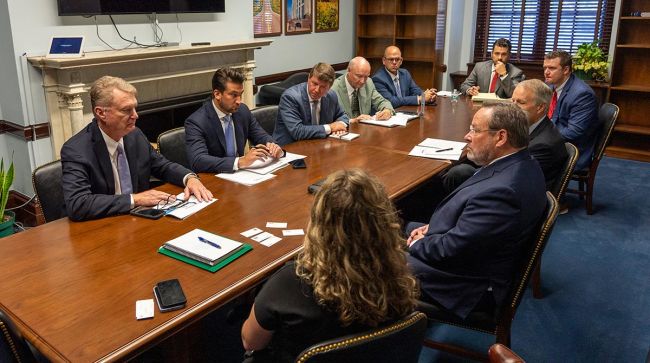Members of the Clean Freight Coalition pressed for funding specific for the trucking industry as part of transportation electrification efforts. (SunJae Smith/American Trucking Associations)
WASHINGTON — A coalition of freight stakeholders called for greater emphasis on the heavy-duty sector as federal lawmakers and regulators continue to prioritize electric vehicles nationwide.
During its initial formal meetings with key officials, the Clean Freight Coalition pressed for funding specific for the trucking industry as part of ongoing transportation electrification efforts. On July 26, the group met with the Joint Office of Energy and Transportation, as well as policymakers central to the issue.
“They were interested in hearing what the challenges are for the heavy-duty vehicle industry. And so we shared a lot of those challenges and concerns with them and we’re looking forward to collaborating with them,” Jim Mullen, the coalition’s executive director, told Transport Topics shortly after meeting with the joint office and members of Congress.
As part of its advocacy for the industry’s needs, Mullen explained the coalition would continue to provide federal officials with relevant real-world data to assist with their decision-making process. For instance, the group pointed to a recent study that determined charging stations specific to commercial Class 8 vehicles would need to be installed in drastically greater numbers to meet federal objectives.

From left: Scott McCandless, Andy Richard, Dan Van Alstine and Jim Mullen at the Capitol. (SunJae Smith/American Trucking Associations)
“There’s nothing better than real-life on-the-ground data, and the members of the Clean Freight Coalition are the best-suited to provide that data. So we look forward to giving that to them and working with them,” Mullen continued. “We have to be talking about other fuel sources, and they were receptive to that, of course. So it was really our first step with them. We’re looking forward to more conversations, and they surely showed interest in having continued conversations, as well.”
Dan Van Alstine, chairman of American Trucking Associations and president and COO at Ruan Transportation Management Systems, participated in the discussions. ATA is a member of the coalition.
“We’re an industry and we are a coalition that wants to have constructive, collaborative conversations about the ‘how.’ There are a number of barricades, and I’ll describe them as barricades because we can get over them. But we have to do that when we can work together, share data, have objective views of what is real, both in terms of time and technology,” Van Alstine told TT. “And so from my perspective, I think we had a great day of truly demonstrating the coalition’s commitment, as well as trucking’s commitment.”
At issue for the coalition is a California Air Resources Board mandate requiring manufacturers to transition from selling diesel-powered trucks and vans to electric zero-emission trucks in the coming years.
“The trucking industry needs adequate lead times across all market segments to ensure these vehicles are affordable and supported by the necessary infrastructure,” said Scott McCandless, chairman of American Truck Dealers, in a statement provided by the coalition. ATD is a coalition member. “It is troubling that government is pushing the regulation of zero-emission vehicles in a way that could slow down rather than accelerate the adoption by truck customers.”
The Joint Office of Energy and Transportation was created by 2021’s Infrastructure Investment and Jobs Act. Its objective is to set up an electric vehicle charging network nationwide. The bipartisan infrastructure law President Joe Biden signed in 2021 provides about $8 billion for electric vehicle programs.
“The office will be a critical component in the implementation of the [bipartisan infrastructure law], providing support and expertise to a multitude of programs that seek to deploy a network of electric vehicle chargers, zero-emission fueling infrastructure, and zero-emission transit and school buses,” according to the Biden administration. “The scope of the joint office will continue to evolve as directed by both departments.”
During meetings with lawmakers on Capitol Hill, the coalition pressed for the repeal of a World War I-era excise tax on new trucks, a goal for which legislation is pending; Earlier this year, Sens. Ben Cardin (D-Md.) and Todd Young (R-Ind.) unveiled the Modern, Clean and Safe Trucks Act of 2023.
“It’s time to repeal this outdated and onerous tax on our Hoosier truckers,” Young said. House lawmakers have introduced a similar version. Both measures await consideration in a committee.
The coalition argued that repealing the long-standing 12% tax would assist the freight sector to upgrade fleets of commercial vehicles. As it stands currently, the tax is considered an impediment by the industry.
“We emphasized that to get the most immediate beneficial impact to the environment, which is what all parties are trying to do here, [Congress must] repeal the federal excise tax,” Mullen affirmed.
“Repealing the 12% federal excise tax on heavy trucks and trailers will help all businesses reduce costs, address supply chain challenges and lower costs for essential goods for families, especially in rural areas,” Rep. Doug LaMalfa (R-Calif.), a co-sponsor, explained.
Clean Freight Coalition members include ATA, ATD, Natso, the National Motor Freight Traffic Association, the National Tank Truck Carriers and the Truckload Carriers Association.






